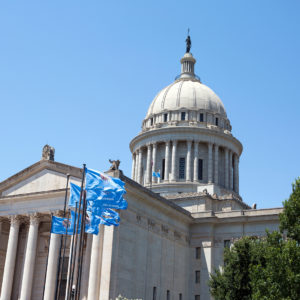Oklahoma lawmakers met on Saturday for a rare weekend session aimed at trying to close an $880 million hole in the state’s budget. It’s a grim fiscal reality that has already led school districts to eliminate summer school programs and teacher positions as they attempt to cut millions from their budgets in anticipation of lost state funding. As the state scrambles to make up its shortfall, oil industry tax increases have become a key sticking point, and Oklahoma billionaire George Kaiser is one of the more visible figures urging tax increases, despite having made millions earlier in his career by manipulating the tax code.
Last week, in an op-ed for the Tulsa World, Kaiser described Oklahoma’s government services and quality of life as a “race to the bottom” and addressed what he deemed “eight myths.” In the piece, he argued that the only way to save the state from a “fiscal meltdown” was by understanding that the principles behind its current tax policies were in fact myths, preventing the state from achieving higher economic growth.
In the piece, Kaiser sought to rebut the arguments that low taxes generated economic development and that the state’s budget woes were a result of the decline in oil prices. Roughly 25 percent of Oklahoma state tax revenues come from taxes on oil.
Kaiser makes for an odd spokesman in favor of increased taxes. In 2011, a report by the a nonpartisan group advocating for open government, found that the Oklahoma billionaire had largely avoided paying taxes for years by exploiting loopholes in the tax code.
“Kaiser has built his fortune in part through shrewdly playing the Internal Revenue Code,” the report found. “In one six year period, during which he increased his net worth enough to land him on the Forbes list of the 400 wealthiest Americans, Kaiser reported taxable income to the Internal Revenue Service just once, totaling $11,699–equivalent to a full-time hourly wage of $5.62.”
In 1997, Kaiser and his companies were billed for $72 million in back taxes and fees covering the period between 1986 and 1992. Much of Kaiser’s tax avoidance resulted from his acquisition of bankrupt energy firms in the 1980s, allowing him to use the companies’ past losses to help minimize their future tax burden.
At the time, this practice was allowable. Since then, the IRS has revised the tax code and has clarified that losses resulting from acquisitions to evade or avoid income tax are prohibited. However, Kaiser was still able to settle for far less than the original bill.
Despite his own experiences playing the tax code, Kaiser is now defending higher tax rates to preserve funding for education and other programs in Oklahoma. Kaiser’s foundation is a major donor to the Oklahoma Policy Institute, a state-level think tank that has pushed strongly for increased taxes on the oil industry to make up the budget shortfall.
Given the state of Oklahoma’s finances, the oil industry is not averse to paying more–the question is just how much. According to the industry, the sort of tax increase that Kaiser and others have pushed for would cripple development, leading to lower employment and a weaker state economy.
However, two state oil and natural gas industry groups have already agreed to compromise on tax increases for the sake of the state budget. On Friday, the Oklahoma Independent Petroleum Association and the Oklahoma Oil and Gas Association held a joint press conference where they presented their plan to help the state avoid “draconian” program cuts.
The oil industry is willing to raise the Gross Production Tax, which is levied on new wells for 36 months, from two to three percent. The rate increase is still far lower the five percent tax that state Democrats have advocated. Industry officials fear that raising the tax higher than three percent will discourage drilling, making the state’s economy worse off overall.
“We want to keep Oklahoma competitive,” said OIPA Vice President Tim Wigley. “We’re the number one target of oil and gas investment across the country and we fare better than most other states, all other states in this downturn. So when you compare state to state and so forth, that’s how we fared better, because we had a drilling incentive to drill in Oklahoma.”
State lawmakers have been divided largely along party lines on the issue of how to close the budget gap. Republicans have proposed a compromise position that raises taxes on cigarettes, gasoline, and oil and gas production. Democrats rejected the plan, arguing that the fuel tax increase would hurt the middle class and that the oil industry should be taxed at a still higher rate. In response, state Republicans say that they are preparing another proposal which includes further cuts to state programs.

